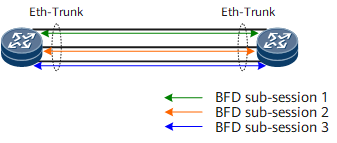BFD for Link-Bundle
Two routing devices are connected through an Eth-Trunk that has multiple member interfaces. If the Eth-Trunk fails and common BFD is used, only one single-hop BFD session is created. After the creation is complete, BFD selects the board on which a member interface resides as a state machine board and monitors the member interface. If the member interface or state machine board fails, BFD considers the entire Eth-Trunk failed even if other member interfaces of the Eth-Trunk are Up. BFD for link-bundle resolves this issue.
- Each sub-session independently monitors an Eth-Trunk member interface and reports the monitoring results to the main session. Each sub-session uses the same monitoring parameters as the main session.
- The main session creates a BFD sub-session for each Eth-Trunk member interface, summarizes the sub-session monitoring results, and determines the status of the Eth-Trunk.
- The main session is up if any sub-session is up.
- The main session is down only when all its sub-sessions are down.
- If no member interfaces are added to the Eth-Trunk interface, the BFD for link-bundle session does not have sub-sessions. In this case, the main session is down.
The main session's local discriminator is allocated from the range from 0x00100000 to 0x00103fff without occupying the original BFD session discriminator range. The main session does not learn the remote discriminator because it does not send or receive packets. A sub-session's local discriminator is allocated from the original dynamic BFD session discriminator range using the same algorithm as a dynamic BFD session.
Only sub-sessions consume BFD session resources per board. A sub-session must select the board on which the physical member interface bound to this sub-session resides as a state machine board. If no BFD session resources are available on the board, board selection fails. In this situation, the sub-session's status is not used to determine the main session's status.
